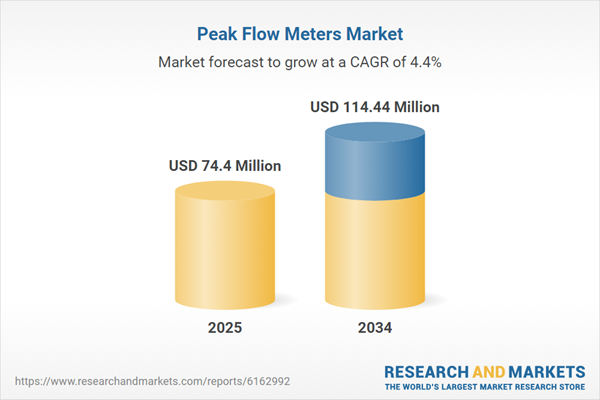Peak Flow Meters: Introduction
A peak flow meter is generally used to measure airflow within the lungs while blowing the air out and in as hard as possible, which is further pronounced as the peak flow. Peak flow measures how open are the airways in the person's lungs. A significant drop in the peak flow can be experienced even before the patient starts to feel bad, which may indicate the worsening of asthma in most cases. Measuring peak flow may help to learn about the cause or trigger of the drop. It also helps in deciding on the addition or deduction of a particular medication from the current prescription.There are two types of peak flow meters, including a digital peak flow meter, which provides two readings: PEFR and forced expiratory volume (FEV1). Another peak flow meter is the mechanical peak flow meter which only measures PEFR. Many come with charts you can fill in manually, to keep a record of your readings. PEFR is the maximum amount of air breathed during the test. FEV1 is the amount of air breathed out by the patient within one second of using the meter. Digital monitors enable downloading patient readings to share with the doctor via email or text.
Global Peak Flow Meters Market Analysis
The increased prevalence of asthma across the world is the major reason behind the increased adoption of peak flow meters. The increasing air pollution, increased smoking habits, and genetic reasons are the major factors behind developing asthma. The increased initiatives by the government and organizations such as the World Health Organization towards curbing the increased burden of the disease are contributing to the peak flow meters market demand. For example, the WHO Global Action Plan for the Prevention and Control of NCDs and the United Nations 2030 Agenda for Sustainable Development include prevention measures and other strategies to get rid of asthma worldwide. WHO is taking several actions to extend the diagnosis and treatment of asthma. Additionally, according to the data released by WHO recently, asthma affected an estimated 262 million people in 2019 and caused 455,000 deaths.Furthermore, the increased focus on launching new and advanced products to measure peak flow in patients is a major trend influencing the global peak flow meters market growth. For example, Remote patient monitoring (RPM) solutions provider Tenovi has introduced a new cellular-enabled remote peak expiratory flow meters (PFM) for patients with asthma. This new device is integrated with Tenovi's cellular gateway to help asthma patients immediately transmit PEF and 1-second forced expiratory volume (FEV1) readings to clinicians. This new device is Bluetooth-enabled RPM, designed to automatically send PEF and FEV1 to the Tenovi Cloud through the Tenovi Health Hub. This device transmits data to a clinician portal to enable remote monitoring of patients. Such innovations are expected to majorly influence market growth further.
Global Peak Flow Meters Market Segmentations
Peak Flow Meters Market Report and Forecast 2025-2034 offers a detailed analysis of the market based on the following segments:Market Breakup by Product
- Digital Peak Flow Meters
- Mechanical Peak Flow Meters
Market Breakup by Indication
- Chronic Obstructive Pulmonary Disease
- Asthma
- Others
Market Breakup by End User
- Hospitals and Clinics
- Homecare Settings
- Diagnostic Centres
- Others
Market Breakup by Region
- North America
- Europe
- Asia Pacific
- Latin America
- Middle East and Africa
Global Peak Flow Meters Market Overview
The market for peak flow meters is driven by the increased burden of asthma and other respiratory disorders and diseases among people worldwide. The increased demand for medical supplies to cure the infected population is also a major factor driving the market growth. The high adaption rates of a sedentary lifestyle by people including high consumption of alcohol and increased smoking habits coupled with exposure to poor air quality are collectively contributing to the increased demand for peak flow meters in the market. The market is also driven by increased patient awareness about respiratory disorders, early diagnosis, and timely treatment of diseases. Peak flow meters are heavily involved in the treatment of chronic respiratory infections. The increased focus of key players in the market on introducing new and innovative products in the market is a major factor driving the global peak flow meters market growth.Geographically, North America is dominating the regional market driven by the increased technological advancements in the region. The dominance is further driven by the increased government initiatives and favourable reimbursement for the diagnosis of respiratory diseases, providing an opportunity to further boost the market growth.
Global Peak Flow Meters Market: Competitor Landscape
The key features of the market report include patent analysis, grants analysis, clinical trials analysis, funding and investment analysis, partnerships, and collaborations analysis by the leading key players. The major companies in the market are as follows:- Siemens.
- Hoffer Flow Controls, Inc.
- Vitalograph Ltd.
- John C. Ernst Co., Inc.
- Medline Industries, Inc.
- Esko Industries
- Becton, Dickinson, and Company.
- ResMed Corp.
- Koninklijke Philips N.V.
- JSB Health & Fitness Pvt Ltd.
- Haag-Streit Holding AG
- DeVilbiss Healthcare LLC
- Teleflex, Inc.
This product will be delivered within 3-5 business days.
Table of Contents
Companies Mentioned
- Siemens.
- Hoffer Flow Controls, Inc.
- Vitalograph Ltd.
- John C. Ernst Co., Inc.
- Medline Industries, Inc.
- Esko Industriesa
- Becton, Dickinson, and Company.
- ResMed Corp.
- Koninklijke Philips N.V.
- JSB Health & Fitness Pvt Ltd.
- Haag-Streit Holding AG
- DeVilbiss Healthcare LLC
- Teleflex, Inc.
Table Information
| Report Attribute | Details |
|---|---|
| No. of Pages | 350 |
| Published | July 2025 |
| Forecast Period | 2025 - 2034 |
| Estimated Market Value ( USD | $ 74.4 Million |
| Forecasted Market Value ( USD | $ 114.44 Million |
| Compound Annual Growth Rate | 4.4% |
| Regions Covered | Global |
| No. of Companies Mentioned | 13 |









